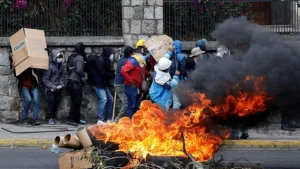The South Sudanese Civil War ended in 2020 following the peace agreement signed by President Salva Kiir Maardit and Vice President Riek Machar Teny. However, while the peace deal to create a unity government marked the end of the civil war, clashes between the ethnic groups still occur in various parts of the country.
On November 19, fighting took place in the Abyei region among the rival factions of the Dinka ethnic group, which resulted in the killing of at least 32 civilians.
Following the brutal conflict among the ethnic groups, another clash took place in Leer County between the South Sudan People’s Defense forces and the Sudan People’s Liberation Movement-in-Opposition forcing thousands of people to flee their homes.

What happened in the South Sudanese Civil War (2013-2020)?
South Sudan gained independence from Sudan on 9 July 2011 becoming the 193rd country officially recognised by the United Nations. After its independence, South Sudan faced a large number of political clashes, including the Civil War that broke out in 2013.
The Civil War began after President Kiir fired the vice-president Machar, alongside the whole cabinet ministers. President Kiir accused Vice President Machar and his allies of attempting a coup, which led to fighting between the two major ethnic groups, the Dinka and the Nuer. Dinka is considered the largest ethnic group, followed by Neur, which is the second largest ethnic group in the country.
Soldiers from the Dinka ethnic group sided with President Kiir, and those from the Nuer ethnic group joined Vice President Machar. Vice President Machar fled the government and founded a new political party known as the Sudan People’s Liberation Movement-in-Opposition. The military conflicts between the Sudan People’s Liberation Movement and the Sudan People’s Liberation Movement-in-Opposition resulted in a brutal civil war.
What were the peace deals and their outcomes?
During the civil war, a series of negotiations were signed. One of those negotiations of a peace agreement was signed by President Kiir and Vice President Machar in 2015. After the peace agreement, Machar returned to South Sudan, but his return shaped a clash between the governmental forces and the opposition side. As a result, Machar fled the country.
In 2018, a negotiation of a peace agreement to end the civil war was held in Khartoum. In August, President Kiir and Vice President Machar signed the Khartoum Declaration of Agreement. The agreement resulted in reducing the fighting between the government and opposition groups, but it had many flaws similar to the issues that happened following the previous peace agreements.
After signing the peace deal, South Sudanese parties started the first discussion on power shaping and security arrangements. The parties agreed on a security arrangement, giving Uganda and Sudan the role of monitoring and reinforcing the cease-fire.
In 2020, President Kiir and Vice President Machar agreed on ending the civil war and creating a unity government. As a part of this agreement, Machar was rehired to his previous position as the vice president of the country. The civil war resulted in the killing of 50,000 people and displacing two million civilians.
How is the conflict in Sudan impacting South Sudan?
The South Sudanese Civil War impacted the country’s economy and led to major issues in the country. As for now, South Sudan remains one of the poorest nations, and political instabilities always result in displacing civilians and negatively affecting the economy. Furthermore, South Sudan is not only affected by internal conflicts but also by external clashes, including the war in Sudan.
The Sudanese War forced a large number of civilians to flee the country and find shelters in the neighboring countries, including South Sudan. South Sudan is a poor nation facing a humanitarian crisis and more refugees can result in increasing the crisis among the nation. South Sudan is not capable of providing the refugees with food and shelter due to the instability in its economy.
The conflict in Sudan puts at risk the oil that passes through Sudan to South Sudan. The South Sudanese economy is dependent on oil and if the war continues, South Sudan could lose the opportunity to get oil. Additionally, the war puts a big risk the deal struck with Khartoum on oil exports. If the Sudanese government collapses, South Sudan will no longer get oil exports from the capital.
Sudan is one of the guarantors of the peace agreement that was signed by President Kiir and Vice President Machar in 2018. The ongoing war poses a substantial threat to the peace agreement since Sudan and Uganda are the nations that play a significant role in bringing peace to South Sudan. Moreover, the conflict in Sudan has the potential to exacerbate the political turmoil in South Sudan and intensify tensions among various ethnic groups.
Photo: AP Photo/Maura Ajak







